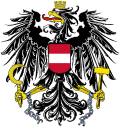| Ambassador of the Republic of Austria to the Kingdom of Spain | |
|---|---|
 Coat of arms of Austria | |
| Ministry of Foreign Affairs Embassy of Austria, Madrid | |
| Style | His Excellency |
| Website | Austrian Embassy, Spain |
The Ambassador of the Republic of Austria to Spain is the Republic of Austria's foremost diplomatic representative in the Kingdom of Spain. As head of Austria's diplomatic mission there, the ambassador is the official representative of the president and government of Austria to the Prime Minister and the government of Spain. The position has the rank and status of an Ambassador Extraordinary and Minister Plenipotentiary and the embassy is located in Madrid. [1]
